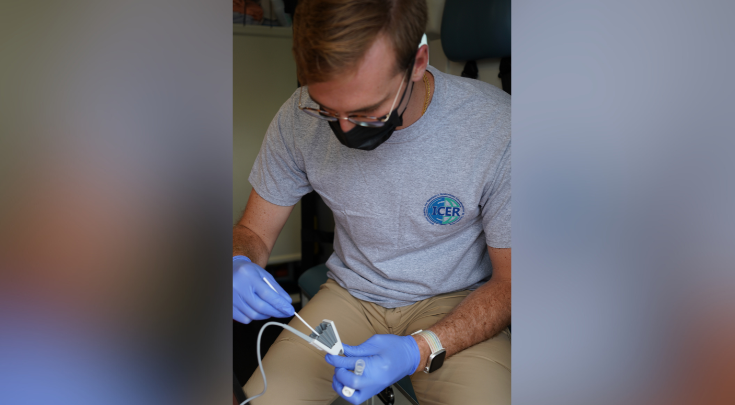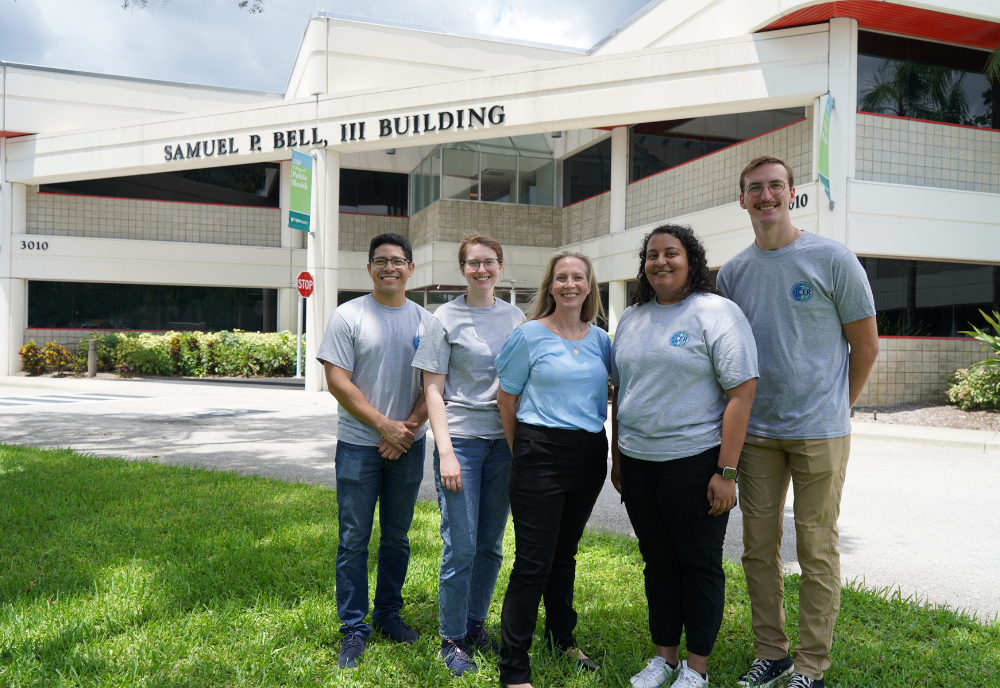Most of us keep our distance from people with a cold, flu, COVID-19 or other nasty conditions, but what about those who meet them up close, often under stressful circumstances? How do first responders stay healthy in otherwise unhealthy places?
That’s the focus of a student at the University of South Florida’s College of Public Health (COPH) currently working on his master’s with a concentration in global communicable disease and epidemiology. Logan Sharp summarized his efforts in a presentation titled “Needs Assessment of Infection Prevention and Control Training for Emergency Responders (ICER),” which he gave at the 2024 Interprofessional Education Collaborative fair and won best poster.
Sharp is no ordinary college student, and his journey goes well beyond the classroom. While studying for his degree, he gained firsthand experience working alongside other firefighters and emergency medical services teams in real life – and death − situations.
“Balancing emergency response with academics has shaped my perspective on public health and reinforced my passion for communicable disease prevention,’’ Sharp said.
This experience gave him invaluable insight into what experts call infection prevention and control (IPC) and continues to motivate him as he prepares to graduate in August.
“This topic is deeply personal,’’ he said. “I’ve worked in emergency medicine for nearly six years, and this population consists of my friends and colleagues who face occupational risks every day. I want to be part of the effort to make emergency medicine safer, not just for first responders, but for the communities we serve.’’
Sharp, 25, knows firsthand of the infection risks that firefighters and EMS personnel face and the need for prevention and control training tailored to their situation. Ultimately, research in this area benefits society as a whole by keeping its protectors safe and healthy.
“First responders are a cornerstone of public health,’’ Sharp said. “They are the first on the scene in emergencies and the last to leave during evacuations. They commit to upholding our health and assure peace of mind to communities across the United States.’’
The ICER collaborative training hub is led by Dr. Christine McGuire-Wolfe, who said that Logan’s experiences as a firefighter and EMT are critical to his student work.

Sharp swabbing the USF MRU for an ICER initiative. (Photo courtesy of Sharp)
“Paired with his interest in microbiology and epidemiology, it allows him to contribute in meaningful ways to ICER's efforts,’’ she said. “Input from field personnel is an essential component for ICER as we develop infection prevention and control training materials specific to the needs of the fire service and EMS."
ICER houses a multi-disciplinary project team that contributes to program planning, determination of delivery methods and evaluation. The goal is to help first responders be better prepared to handle difficult situations, whether inside a burning building, at the site of a car accident, in a cramped ambulance or in a sick person’s home.
“Most of the time, when first responders are at a scene, they’re working at a tempo to save lives in conditions that are not always advantageous,’’ Logan said. “Factors such as severe weather, natural disasters, or the urgency of a patient’s condition make infection prevention challenging compared to other health care settings.’’
“While it wouldn’t be accurate to say they are in constant danger, first responders do face an elevated risk of infectious exposure due to the unpredictable and fast-paced nature of their work,’’ he added. “EMS workers face a dynamic work environment that is not found anywhere else in health care. Because of that, they face unique risks of infectious exposures in the field.’’
Sharp’s journey began at Auburn University, where he graduated in 2022 with a BS in microbial, cellular and molecular biology. He was initially going into veterinarian medicine, but became intrigued by the link between zoonotic diseases and people, which led him to work as a structural firefighter/EMT.
“This interest in microbes led me to focus my studies on disease and human health, pivoting me to public health, specifically communicable disease epidemiology,’’ he said. “I never thought I would find a field combining my interests in microbiology, emergency medicine and population health.’’
The COVID pandemic highlighted critical gaps in EMS preparedness and training, particularly in infection control, Sharp said. Many departments had to adapt on the fly, often without adequate guidance. Currently, infection prevention training is mostly reactive and Sharp believes it needs to be proactive to better prepare for what could be a more deadly scenario.
“The urgency is real,’’ he said. “If we don’t act now, first responders could find themselves unprepared for the next outbreak, putting both themselves and the public at greater risk.’’
